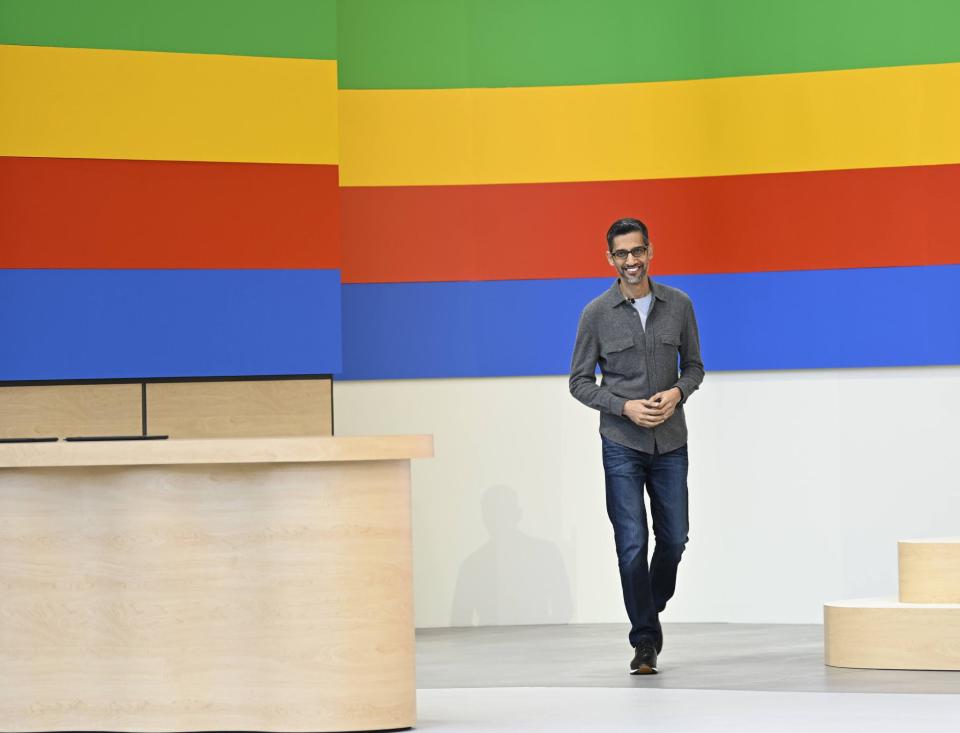Google I/O shows why the search giant is sitting pretty against OpenAI

Google’s annual I/O developer conference kicked off yesterday, under the circus-like big top of the Shoreline Amphitheater, with improvisational musician and YouTuber Marc Rebillet climbing out of a giant Google coffee cup in a rainbow-colored robe. He stepped up to a DJ booth to show off Google’s new generative AI music tool, called MusicFX, with a demo filled with thumping beats meant to wake up, he shouted, the “silly little nerds.”
It was a surprisingly silly moment after several days of serious buildup to this week of AI announcements, which turned out to include a preemptive product launch from OpenAI. Social media amped up sky-high expectations about how OpenAI might steal Google’s thunder: An announcement of its own ChatGPT search? A surprise roll-out of GPT-5?
For a moment, it was easy to imagine Google getting, well, screwed by OpenAI's advance move. Or screwed once again, more accurately. After all, a year ago there were plenty of headlines like 'AI First' To Last: How Google Fell Behind In The AI Boom. After ChatGPT launched in November 2022, there were reports that Pichai had declared a ‘code red’ inside the company in response, so panicked was he about the threat OpenAI and its alliance with Microsoft posed to Google's business. From the outside, at least, it seemed like a humiliating takedown, considering that Google had been so far ahead in AI in 2019 that Microsoft decided to invest in OpenAI because it was “very worried” that Google was so far ahead in AI. And at 2023's Google I/O conference in 2023, the company seemed decidedly defensive, reminding the audience multiple times of how Google had been the first "AI first" company, and rolling out a slew of disjointed and not fully-thought-out product offerings and demos. The whole thing seemed rushed and designed to simply match Microsoft and OpenAI.
This year was a whole different vibe. By yesterday afternoon, when both OpenAI's and Google's live-streamed announcements were finished—with nothing but memories left of OpenAI’s emotive-on-steroids voice assistant; Google’s rollout of AI Overviews in search; and several demos featuring dogs—it was clear why Pichai seemed so much more relaxed this year. It’s because far from screwing up on AI, Google actually is sitting pretty. Not only has it caught up to the point that its Gemini models are considered in the top-tier, but it has renewed confidence in the strength of a moat that OpenAI cannot easily cross: Google's vast consumer distribution across a deep and broad mix of products with billions of users. Many have accused Google of being bloated, bureaucratic and slow. But it has unparalleled scale.
Jim Fan, a Nvidia senior research manager and lead of embodied AI, said it succinctly in an X post yesterday. “Google's strongest moat is distribution,” he wrote. “Gemini doesn't have to be the best model to be the most used one in the world.”
OpenAI may have a technical lead—GPT-4 remains the state-of-the-art AI model to beat for certain reasoning tasks, for one thing—and as a startup with an $80 billion private market valuation, it may also be able to move faster than Google. But Google has Search, Gmail, Maps, Photos, Calendar, Drive, Docs, Sheets and Android. By integrating generative AI into all of those products and using AI to tie them all together (for example, an AI-powered workflow that scours your Google applications for data to bring into Sheets and also your Calendar) it can keep users coming back for more. Even the Google search box already ties in AI across products, offering options to search photos, translate text, solve homework with Google Lens, identify songs and shop for products in screenshots.
Furthermore, if Google’s distribution is its strongest moat, its secret sauce is arguably the massive amounts of data that flows through its products every day—petabytes from web searches, YouTube videos, Map requests, customer reviews, and much more. In addition to training its models, users can ask Google's AI features to dig through data stored in Google apps to help with an ever-increasing array of personalized tasks–basically using Google to Google your own Google.
Of course, none of this means Google’s future AI success is assured. It may be able to rack up user numbers with its deep product bench and broad reach, but when it comes to revenue, the company’s business model is wrapped around Search. And it remains to be seen whether the rollout of AI Overviews in Search will cannibalize its referrals and ads business. It also remains uncertain how badly generative AI -created content will pollute the entire information ecosystem, resulting in worse search results—whether AI-generated or ranked links—and driving users away. In addition, while it can’t be as nimble and quick as OpenAI, Google needs to avoid tying itself in knots over being "responsible," as it did during the “woke” image controversy around Gemini back in February.
But, it increasingly looks as though OpenAI will have to wage an uphill battle. If it wants to beat Google on consumer-facing AI products, it will have to show that it roll-out AI models that are better than Google's by a wide margin, and it will have to keep rolling those out to stay ahead. A rumored partnership with Apple to add ChatGPT to iPhones could help—Apple has the distribution OpenAI lacks, even with its Microsoft partnership. But short of announcing that the company has somehow reached AGI (whatever it deems that to be), Google has shown it will be very difficult to dislodge it from being the AI most consumers are likely to use.
This story was originally featured on Fortune.com

 Yahoo Finance
Yahoo Finance 